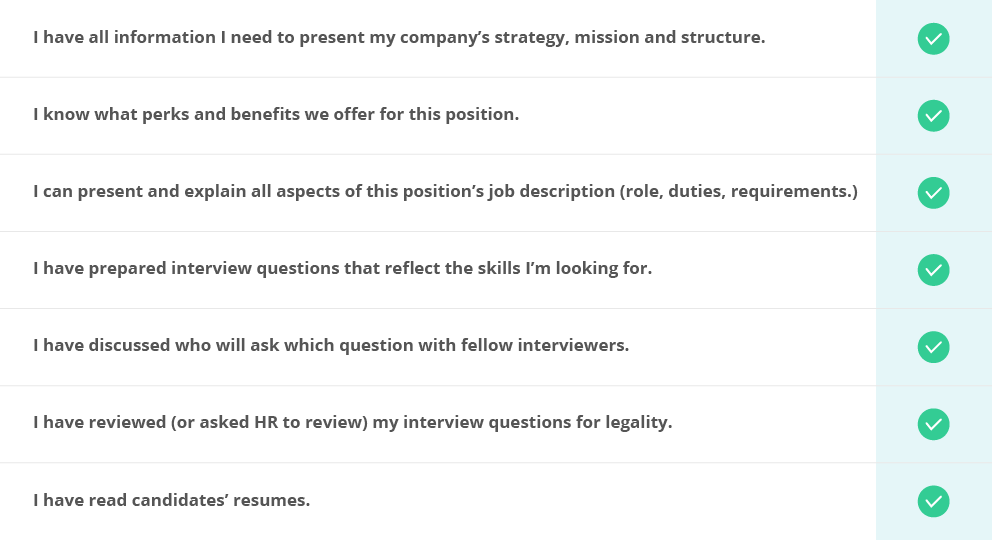How to conduct an interview: An interview checklist
Conducting an interview involves preparation, crafting effective questions, experimenting with different formats, practicing your pitch, combating bias, and seeking advice. It's a process that requires careful planning, clear communication, and a focus on job-related characteristics to ensure a fair and effective evaluation of candidates.

Learning how to conduct an interview effectively can be challenging, but hiring the best candidate is a worthwhile reward.
Use this guide and interview checklist for employers to improve your interviewing skills:
Contents
How to prepare to interview someone for a job
Modify and use this checklist to help you prepare for an interview:

It’s a good idea to set aside some time before and after interviews. That way, you can comfortably welcome candidates and avoid having to rush them out at the end of their interviews.
Craft effective interview questions
A big part of your interview preparation is deciding what questions to ask candidates. You can find many interview questions sorted by job and type on online libraries. Here are some tips to assess candidates effectively:
- Focus on behavioral and situational questions.
- Find alternatives to cliche questions to avoid canned responses.
- Look for people who can bring a new perspective to your team, instead of being an exact “culture fit.”
- Tie interview questions to job requirements. Craft a few questions to assess each skill you’re looking for.
Experiment with a different interview format
Unstructured interviews that flow like friendly conversations make the process pleasant for both candidates and interviewers. But, they aren’t the most effective way to hire the best candidate.
Structured interviews are better predictors of job performance, more legally defensible and better for record-keeping. During structured interviews, you ask the same questions to all candidates in a specific order and score them with a predetermined rating scale. Your Applicant Tracking System may have built-in checklists or interview scorecards to help you rate candidates this way.
Related: The pros & cons of interview scorecards
Practice your pitch
Both interviewers and candidates are evaluating each other during interviews. While you assess whether candidates are right for the job, candidates try to determine whether they want to work for you. If they’re not convinced, they might end up rejecting your job offer.
Prepare a checklist to sell your company and the position you’re hiring for. You could include:
- How your company tries to fulfill its mission.
- What your company does to keep employees happy and motivated.
- Any plans that have been announced to expand or improve your company.
- What challenges someone who works in the role you’re hiring for may face and how your company supports its employees (e.g. training, mentoring.)
- How that particular position fits into your organizational structure and contributes to your company’s success.
Also, listen to what candidates indicate they look for in a job to personalize your pitch.
Combat your bias
We are all prone to cognitive biases. Just decades ago, those who interviewed musicians to join orchestras were unwittingly making biased hiring decisions, resulting in almost all-male orchestras. They hired more women when they started using blind hiring methods.
Here’s how to fight bias in your interviewing process:
- Learn more about how biases work. Research biases to spot instances that can activate them. You could watch related videos, like this satirical one by management consulting firm McKinsey & Company, which reveals how women face unconscious biases at work:
- Identify your own biases. Despite good intentions, biases may interfere with your hiring process. Take one of Harvard’s Implicit Association Tests to discover whether you have hidden racial, religious or sexual orientation biases.
- Learn to discard “noise” (irrelevant information.) Ask yourself whether certain characteristics really affect a candidate’s job performance. For example, how candidates dress may matter for sales executives, who are usually in customer-facing roles, but not so much for developers.
- Slow down your decision making. Interviewers often come to a decision about a candidate very early in an interview. Take your time and consult your notes afterwards to form an opinion on candidates.
- Focus on job-related characteristics. If you want to assess Java coding skills, use assignments or ask candidates to solve problems on a whiteboard. Asking which school they attended to learn how to code may not be as demonstrative of their skills.
- Resist hiring in your own image. Interviewers often end up hiring “mini-mes” who represent candidates similar to them (e.g. who have the same hobbies.) Hiring managers who hire “mini-mes” miss out on the best candidates, build homogenous teams, lose diversity’s advantage and fail to fill team skill gaps.
Seek advice
Hiring doesn’t have to be a lonesome road. Recruiters can be great allies when learning how to conduct an interview. Ask for their advice when you want to:
- Develop your own employer interviewing checklist.
- Build rapport with candidates.
- Review your interview questions.
- Give interview feedback to rejected candidates.
- Conduct mock interviews to improve your interviewing skills.
- Arrange official training courses with professional organizations.
Recruiters can also help you preserve an interview’s legality. For example, it’s illegal to ask an interviewee whether they plan to have children, even if your goal is to make small talk. A good recruiter will advise against asking that question.
Improving your interviewing skills takes time, but the payoff is worth it. Effective interviews bring you one step closer to hiring the right people to reinforce your team.
Frequently asked questions
- How do recruiters start interviews?
- Recruiters start interviews by introducing themselves and any panel members, explaining their roles, offering the candidate water, and establishing rapport. They also provide a high-level overview of the interview process and the job.
- What should the interviewer keep in mind while conducting an interview?
- Interviewers should set the stage with the candidate and review the job together. They should start with generalized questions to build rapport and ask consistent questions to compare candidates equally.
- What are four things to keep in mind to create a positive first impression in an interview?
- Interviewers should be on time, present themselves appropriately, be genuine, and have a winning smile. They should also be open and confident, use small talk, be positive, and be courteous and attentive.
- How can interviewers combat bias in the interviewing process?
- Interviewers can combat bias by learning more about how biases work, identifying their own biases, learning to discard irrelevant information, slowing down their decision making, focusing on job-related characteristics, and resisting hiring in their own image.
- How can recruiters help interviewers improve their interviewing skills?
- Recruiters can help interviewers improve their interviewing skills by providing advice on developing an employer interviewing checklist, building rapport with candidates, reviewing interview questions, giving interview feedback to rejected candidates, conducting mock interviews, and arranging official training courses.




